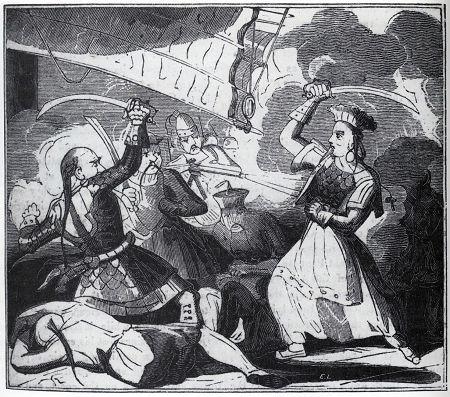Before I read Borges, I used to think there was a sharp dividing line between fiction and nonfiction.
In my own writing, there’s a huge gap between the serious, diligently factual articles I write for The Wall Street Journal and the entirely invented worlds of my novels and short stories.
But Jorge Luis Borges is constantly blurring the lines and playing with the forms, so that it’s intentionally unclear what’s real and what’s invented, and even those categories come to seem less important.
The whole story of The Widow Ching—Pirate, for example, is based on fact, but with the details changed at will. The same applies to most of the stories in A Universal History of Iniquity, the first collection in Borges’s Collected Fictions, which I am now reviewing story by story, a project that is clearly doomed but that I’m enjoying while it lasts.

There’s even a source list at the back of the Universal History, which may or may not be reliable. And the story of the Widow Ching, like those of Lazarus Morell and Tom Castro, is written more as a biography than a short story, with dispassionate listings of dates and events and very few of the usual techniques of storytelling, like scenes, dialogue, physical descriptions, etc.
Borges also likes to take common heroes from adventure novels—pirates, cowboys, gangsters—and strip them of their mystique, their heroism, until they become mere human beings, as flawed and mortal as the rest of us. He generally affords them a page or two of glory, but their ignominious end is never too far away.
The Widow Ching, for example, is allowed to take charge of a huge pirate fleet after the poisoning of her husband and to lay waste to huge areas of the Chinese coast, as well as defeating an armada sent to subdue her.

But just when she seems invincible, her reign ends. Her fleet goes pillaging down the Zhu-Jiang River in celebration of its victory, only to be trapped in the river by a second fleet despatched by the Emperor.
Another grand battle seems to be coming, but it never does. Instead, the imperial ship sends kites of rice paper and reed into the sky, on which a story is slowly spelt out, a fable of a dragon that had always watched over a vixen, despite the vixen’s ingratitude.
The Widow Ching broods over the story night after night before surrendering without firing a shot, with the words:
“The vixen seeks the dragon’s wing.”
The new name she takes, “The Luster of True Instruction”, suggests that she has wearied of violence and takes the chance to alter the course of her life and seek deeper meaning. But, in truth, we don’t know. The story stops abruptly.
And yet the downfall of the Widow Ching, like that of Lazarus Morell and Tom Castro, doesn’t feel like a punishment or a judgment. These characters are not brought low to teach us a moral lesson or to allow us to indulge in a rush of schadenfreude.
Instead, the end feels like the inevitable end of all human endeavour: we grow old, we die, and life moves on without us. The page or two of glory is like the fleeting beauty of a rainbow, the only difference being that the rainbow is not shocked to fade away, but we always are.



There are 5 comments
Love your concluding paragraph! So very true. You say your project is doomed but you are doing really well!
Ah, thanks Stefanie! It’s great to have someone cheering me on 🙂 I guess after missing so many blogging goals over the past 14 years, I’ve developed low expectations. But tomorrow can always be different from yesterday, right? Here’s to part 4!
Posting a wonderful comment by @buriedinprint that didn’t appear here due to a technical glitch:
“This reminds me of something I read in Bina Venkataraman’s The Optimist’s Telescope, about how people never imagine themselves getting old, referring to a study in which participants used software to age themselves in an image, which made them much more likely to establish some sort of savings for their future, older selves (presumably people who weren’t just living at the subsistence level or paycheque to paycheque, who experience that as an accessible option). There are so many ways in which people are not like rainbows, I guess. 🙂 [Our public library is down for maintenance for this long weekend, so I can’t do my usual check to see if the demand for Fictions is down; I’ll have another look on Tuesday! Maybe you just need to think of it as a ten-year project so it’s not doomed. Or can you not imagine yourself reading Borges in ten years? Maybe you need an app? *grins*]”
Interesting post, thank you for the work : )
Hopefully the following stories will be met by similar analysis.
Thanks, Osama. I’ve reviewed quite a few more Borges stories now, so feel free to take a look at the others here: https://andrewblackman.net/borges-marathon/